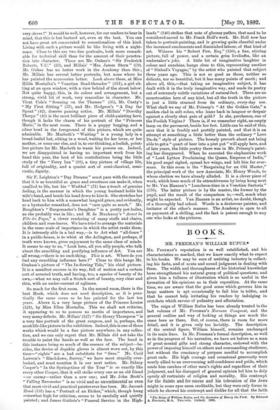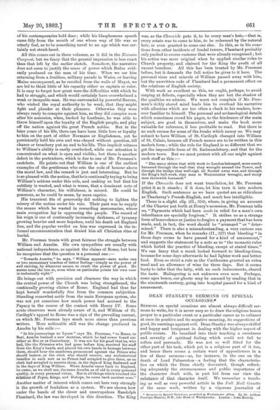BOOKS.
MR. FREEMAN'S WILLIAM RUFUS.* FREEKI,N'S reputation is so well established, and his characteristics so marked, that we know exactly what to expect in his books. We may be sure of untiring industry in collect- ing his facts, and of acute and sound judgment in dealing with them. The width and thoroughness of his historical knowledge have strengthened his natural grasp of political questions, and given him a fullness of illustration which is as useful in the formation of his opinions as in their exposition. At the same time, we are aware that the good sense which governs him in large matters is apt occasionally to fail him in trifles, and that he cannot help irritating his readers by indulging in crotchets which savour of pedantry and affectation.
The reign of William Rufus has been already treated in the last volume of Mr. Freeman's Norman Conquest, and the general outline and way of looking at things are much the same here as there. But, of course, there is room for more detail, and it is given only too lavishly. The description of the central figure, William himself, remains unchanged in its main lines. In Mr. Freeman's formal description, as well as in the progress of his narrative, we have set before us a man of great mental gifts and strong character, endowed with the power of imposing himself on others and commanding obedience, but without the constancy of purpose needful to accomplish great ends. His high courage and occasional generosity were nearly allied to an overweening self-confidence and pride, which made him careless of other men's rights and regardless of their judgment, and his disregard of general opinion led him to defy openly all restraints of religion and morality. His contempt for the Saints and for omens and his toleration of the Jews might in some eyes seem creditable, but they were only forms in which he showed his contempt and dislike for all that the faith • The Reign of William Rufus, and the Accession of Henry the First. By Edward A. Freeman, M.A. Two vols. Oxford. 1882.
of his contemporaries held dear; while his blasphemous speech came fitly from the month of one whose way of life was so utterly foul, as to be something novel to an age which was cer- tainly not strait-laced.
All this comes out in these volumes, as it did in the Norman Conquest, but we fancy that the general impression is less exact than that left by the earlier sketch. Somehow, the narrative does not seem to justify the sense of power which Rufus evid- ently produced on the men of his time. When we see him returning from a fruitless, military parade in Wales, or leaving Maine unconquered, as he recoiled from the walls of Mayet, we are led to think little of his capacity either as captain or ruler. It is easy to forget how great were the difficulties with which he had to struggle, and which would certainly have overwhelmed a weak or incapable man. He was surrounded by powerful Barons, who wished the royal authority to be weak, that. they might fight and plunder at their pleasure. Otherwise they were always ready to conspire against him, as they did conspire soon after his accession, when, backed by Lanfranc, he was able to throw himself upon the loyalty of the English people, and play off the nation against the great French nobles. But in the later years of his life, there can have been little love or loyalty to him on the part of either Normans or Englishmen, yet he persistently held his own and was obeyed without question, till chance or treachery put an end to his life. This implicit witness to William's ability is easily overlooked, while our attention is
concentrated on what is open and visible; but there is another defect in the portraiture, which is due to one of Mr. Freeman's crotchets. He points out that William is one of the earliest examples of the gentleman who sets the code of honour above the moral law, and the remark is just, and interesting. Bnt he is so pleased with the notion, thathe is continually trying to bring William's actions under this rule, and making us feel that his subtlety is wasted, and what is worse, that a dominant note of William's character, his wilfulness, is missed. He could be generous, as he could be mean, by mere caprice.
His transient fits of generosity did nothing to lighten the misery of the nation under his rule. Their part was to supply the means which he wasted in rewarding mercenaries, whose main occupation lay in oppressing the people. The record of his reign is one of continually increasing darkness, of tyranny growing heavier and more hopeless, until his death set' England free, and the popular verdict on him was expressed in the in- formal excommunication that denied him all Christian rites of burial.
Mr. Freeman treats with great fairness the struggle between William and Anselm. His own sympathies are usually with national independence, as against the claims of Rome, but here he recognises that the question is a personal one :-
" Towards Anselm," he says, " William appears—save under one or two momentary touches of better feeling—simply as the power of evil striving, by whatever means, to crush the power of good. He seems none the less so, even when on particular points his own case is technically right."
He brings out with precision and clearness the way in which the central power of the Church was being strengthened, the continually growing claims of Rome. England had thus far kept herself wonderfully free from the common subjection.
Standing somewhat aside from the main European system, she was not yet conscious how much power had accrued to the Papacy in the course of the contest with Henry IV. Some acute observers were already aware of it, and William of St.
Carileph's appeal to Rome was a sign of the prevailing current, on which Mr. Freeman lays much more stress than previous writers. More noticeable still was the change produced in Anselm by his exile
" In his journeyings to Lyons " says Mr. Freeman, " to Rome, to Bari, Anselm learned a new doctrine, which he had never found out either at Bee or at Canterbury. It was not for his good that he, who had, like the Primates who had gone before him, received his staff from the King's hands, and placed his own hands in homage between them, should hear the anathema pronounced against the Prince who should bestow, or the clerk who should receive, any ecclesiastical benefice in such sort as no Prince bad scrupled to give them, as no clerk had scrupled to receive them, in the days of King Eadward and in the days of King William. When Anselm came back to England, he came, as we shall see, the same Anselm as of old in every personal quality, in every personal virtue. But in all things which touched the relations of Popes, Kings, and Bishops, he came back another man."
Another matter of interest which comes out here very strongly is the growth of feudalism as a system. We are shown how under the hands of the clever and unscrupulous Randolph Flambard, the law was developed in this direction. The King was, as the Chronicle puts it, to be every man's heir,—that is, every estate was to come to him, to be redeemed by the natural heir, or even granted to some one else. In this, as in his exac- tions from other incidents of feudal tenure, Flambard probably only pushed to excess customs that were already recognised ; but his action was more original when he applied similar rules to Church property, and claimed for the King the profit of all vacant benefices. All this has been treated by Mr. Freeman before, but it demands the full notice he gives to it here. The personal vices and misrule of William passed away with him, but the unwritten code of Flambard had a permanent effect on.
the relations of English society.
With work so excellent as this, we ought, perhaps, to avoid carping at defects, especially when they are but the shadow of the qualities we admire. We must not complain if Mr. Free- man's richly stored mind leads him to overload his narrative
with allusions which are too often a check to his readers, how- ever familiar to himself. The personal and archaeological details which sometimes crowd his pages, to the hindrance of the main subject, are good in themselves, and make the book more valuable for reference, if less profitable to read. But there is
no such excuse for some of the freaks which annoy us. We may submit to have William of St. Carileph changed into William of St. Calais, because all French names are to be written in this moderh form ; while the rule for England is so different that we get the impossible form of St. Eadmundsbury, and that for the modern town. But we must protest with all our might against such stuff as this :—
" Eke many shires that with work to London belonged, were sorely harassed through the wall that they wrought around the Tower, and. through the bridge that well-nigh all flooded away was, and through. the King's hall-work, that man in Westminster wrought, and many men therewith harassed."
If the Chronicle does not want translation, let Mr. Freeman print it as it stands ; if it does, let him turn it into modern. English. Such sentences as we have quoted are as ridiculous, as Thackeray's French-English, and much less intelligible.
There is a slight slip (IL, 354), where, in giving an account of the Charter put forth at Henry's accession, Mr. Freeman tells us, "Payments which had been made in relief for a man's own inheritance are specially forgiven." It strikes us as a strange form of benevolence or justice to forgive a payment that has been made, and, in fact, the word should be " arranged " or " deter- mined." There is also a misunderstanding, a very carious one- for Mr. Freeman, when he remarks (II., 327) that bleeding " in those days seems to have passed for a kind of amusement," and supports the statement by a note as to "the monastic rules which forbid the practice of bleeding, except at stated We can fancy that a monk looked forward to bleeding-time; because for some days afterwards he had lighter work and better food. Even so strict a rule as the Carthusian granted an extra meal and an allowance of wine for three days. But it seems hasty to infer that the laity, with no such inducements, shared the taste. Malingering is not unknown even now. Perhaps, some ages hence, our ghosts may be amused by reading that in the nineteenth century, going into hospital passed for a kind of amusement.

































 Previous page
Previous page